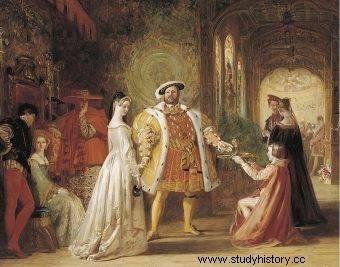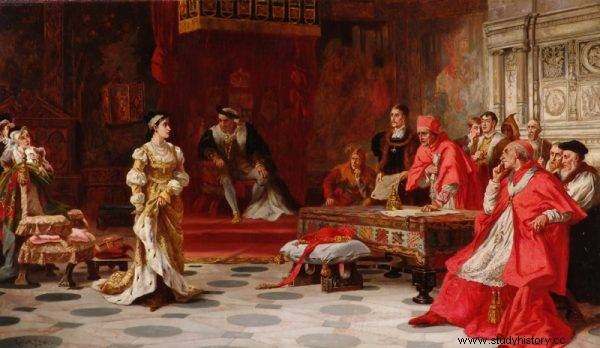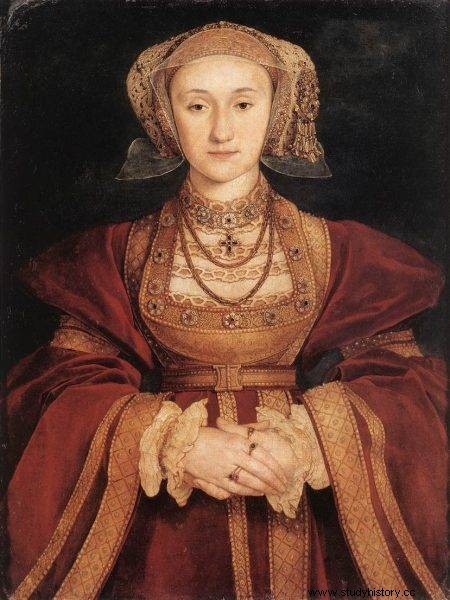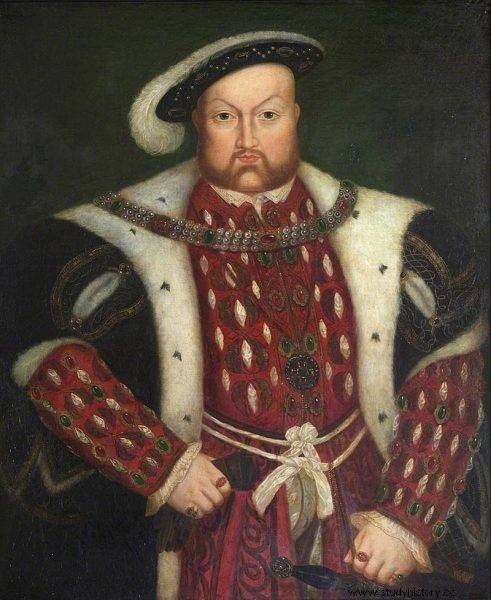Apparently, English men in the time of Henry VIII were considered restrained and not too ardent lovers. Of course, except for the king himself, who was famous for his hot temper. But what if he was unable to conceive a son? He was helped by the medical knowledge of the time, religious orders and prohibitions, as well as ... the invaluable Tomasz Cromwell.
Sixteenth-century society had a different attitude to sex than today, which was manifested, among other things, in strict expectations towards the daughters of Eve. They were guilty of original sin and, being sinful and weak by nature, led men astray. To prevent this from happening, female sexuality should be controlled and desires suppressed by ecclesiastical dictates and prohibitions aimed at fulfillment only in marriage.

Henry VIII put a lot of effort into securing a successor
Women were actually only fit for procreation. God forbid that they would get involved in politics (such ideas were strongly criticized by Anna Boleyn). Author of Mirrors and lights , Hilary Mantel, puts in the mouth of King Henry VIII Tudor the following, for today's chauvinistic standards, but according to the views of the time - the most correct opinion addressed to his adviser, Thomas Cromwell:
I may die tomorrow. I cannot leave my kingdom to my daughters, one of whom is a haunted half-breed Spaniard and the other still a child […]. And tell yourself, can a woman with a weak body and a weak will rule despite all the delicacy of her gender? May she be endowed with determination, a quick mind, but the day will come when she must marry, and then she will either bring a foreigner to share the crown with her, or raise a subordinate to the throne, but who can he trust? The woman as a ruler only accumulates problems. Yes, they can be put off for ten years, twenty years, but they will come eventually.
Due to their "weak nature", women were also considered more prone to marital infidelity. Two of King Henry VIII's wives were sent to the scaffold for adultery, although he himself was free to use with lovers and beget illegitimate children.

The lack of a male heir made Henryk eagerly get rid of another wives
Outside of aristocratic and court circles, where illegitimate offspring were usually educated and raised as befits a high-born person, and often also brought to the court by influential relatives, illegitimate children and their mothers from lower social classes did not have an easy life. A single unmarried woman with a "bastard" was considered a debauchery, even if the pregnancy was the result of rape.
Such views were supported by the medical knowledge of the time, according to which the condition for conception was ... the woman felt pleasure. Hilary Mantel, in the words of Joanna Seymour, Henry's third wife and the only one who gave him a rightful heir, asks Cromwell, then the Lord of the Secret Seal, eloquently:“My ladies say that if a wife does not enjoy sex, she will not conceive a child. Is that true? ”
It can be lively - but not on Fridays, Sundays and holidays
We do not know if Joan Seymour enjoyed intercourse with Henry, but we do know that the king had an affair with her while Anna Boleyn was still alive and married a new bride (not without encouragement from Cromwell, who allied with the Seymour against Anna) in just 11 days after beheading his former wife.
Like her predecessor, Joanna also insisted on keeping her virginity until marriage and did not want to be just a royal misfortune. Obedient and submissive, she tried not to repeat Anna's mistakes, and the fact that she did not get pregnant for the first few months after the wedding was spent on her sleepless nights.
As we read on Mirrors and lights was given lots of advice on what she should do to give the baby (son) to the king quickly . She confides to Cromwell that someone advised her to put agates close to the skin and asks that they be provided, and he cites advice from a sister who has seven children out of two marriages:"[Bess] advises me to refuse Ave Joan, and the king will be over soon. I know from her that she did not enjoy much joy in the marriage bed. With Oughtred, it was like a military maneuver. Quick. ”
Cromwell could advise Joanna a bit, since he himself had several children - three of them from a legitimate marriage and at least one illegitimate. Moreover, his son married Joanna's sister, Elizabeth (the aforementioned Bess), with whom he had five children.
However, the queen could also use numerous guides on marriage (otherwise written by celibate clergy). According to the knowledge of the time, procreation was the only justification for undertaking this sinful activity. Moreover, it was also a sin to perform the marriage duties too often, because the husband should not make his wife a harlot.
The conception of the longed-for son was not favored by a promiscuous lifestyle (but only for mothers) and sex in the position of a rider or from the back, which, in the opinion of those times, belonged to ... animals and pagans. Love was to be made solely in the missionary position, with the wife remaining passive - otherwise the threads of the heir. One of the heroes of the novel, Cromwell's cook by the name of Thurston, summarizes the principles as follows:
The kids with their brother, either those taken on Friday or taken backwards are against nature. That's why they remove themselves, poor sinful creatures. Because what's the point if they are born only to die? […] Some women come upstairs - continues Thurston. - It's not God's way. You can imagine what kind of chuchro will come out of something like this. He won't survive the week.
The sixth finger and the missing twin
In the time of Henry VIII, the birth of a disabled child was considered a divine punishment. It is not difficult to guess that the sixth finger of Anna Boleyn or the reportedly deformed, deformed fetus, were for those days irrefutable evidence of the action of unclean forces. The loss of pregnancy was all the greater as Anna expected a boy who would strengthen her position as queen and fulfill the king's dream.
Henryk's first wife, Katarzyna Aragońska, also lost her unborn children - more than once. After her first miscarriage, she was reportedly desperate enough to try to trick the king. Mantel describes in the novel how Henry confides in Cromwell:
We were newly married - says Henryk. - What could I know then about women and their intrigues? She had a miscarriage of one child, but kept the midwives with her because she claimed she was carrying a twin. Until finally the hoax was released.
- Your Majesty, wasn't that an honest mistake?
- Women are the beginning of all mistakes. Read the theologians and you'll find out.

During Lent, the king excused himself from fulfilling the marriage act with Anna Kliwińska
A miscarriage, which was perceived as a punishment for some offense on the part of the parents, may have been the result of acting contrary to the principles of the Church, including the rules regarding days on which abstinence should be observed. It was a sin to have sex on Sunday and Friday (the day of the crucifixion), but also on Saturdays and Wednesdays and the three days before communion. The spouses were also subject to continence during Lent, Advent, the Easter week or on ordinary holidays, which in the time of Henry VIII were more than today.
During Lent, the king excused himself from fulfilling the marriage act with Anna Kliwijska - his fourth wife, to whom he felt so reluctant that he sent her away (thanks to this, she was the only one to marry Henryk). For about half the days of the year, there was no chance of having sex - at least in theory.
Do not touch your pregnant wife, you better go to the lover
Sex was also prohibited during menstruation, during pregnancy, for 40 days postpartum, and during breastfeeding. The expectant queens were therefore at risk of betrayal by Henry - Anna Boleyn lost her child to the shock of catching the king in an unequivocal situation with Joanna Seymour. Meanwhile, the reasoning of the medics at the time was simple:since a man could not have sex with a pregnant wife without damaging the fetus, and abstinence (as it was believed) could harm him, he had the right to meet the needs of another woman.
Did this make the king a fornicator? Not at all. The rumors about the ruler's promiscuity were greatly exaggerated - Henry was a deeply religious and very discreet man, so you can guess that his approach to sex was in line with the morality and religion of the era. It was certainly a huge blow to him that, as a legitimate monarch, being a healthy and fit man, he could not wait for a successor. The author of the novel puts the following words into the mouth of the resentful ruler:
My father argued that the surest sign of heaven's favor for his reign was the birth of a prince as soon as they married my mother's angelic goodness. In January they got married, and in September they had Arthur in their cradle. It is not a sin to go to bed during an engagement, and even if it does, it is easy to absolution. Later they enjoyed the blessing of many children.
Certainly, the ease of obtaining absolution and not too severe penance (usually fasting, more or less strict) did not detract from forbidden practices, also in a marital alcove. However, in an era when the sole purpose of intercourse was to conceive a child, even the most elaborate position, intermittent intercourse or masturbation were not as scandalous as acts against conception . Contraception was strictly forbidden, although many women preferred to risk punishment rather than conceive unwanted pregnancy.
They allegedly included Henryk's fifth wife, Katarzyna Howard, who was less than seventeen years old, who entered the marriage bed, certainly not a virgin, and did not remain faithful to Henryk, for which she ended up on the scaffold after only two years (childless, by the way, which was not surprising in the case of a woman considered promiscuous) marriage.
The king stuck his finger in, so there will be no heir
Anna Kliwijska, standing with Henryk on the wedding carpet, was probably untouched, but one of the theories says that she remained so, because the king did not live up to the task. Henryk, almost fifty years old, obese and ill, was supposed to be impotent, and the marriage with Anna Kliwijska only masked this unpleasant fact.

The obese, ailing Henryk could not live up to the task
It is said that the princess, who was half his age, smelled foul, and in addition had sagging breasts and belly, which disqualified her as a virgin - and a lover in the eyes of the ruler. The author of the book Mirror and Light puts the following on the lips of Cromwell and Jane Rochford as they talk about Henry and Anne's wedding night:
- Our opinion is that nothing happened - he is informed by [Jane].
- What does Anna say?
- Anna doesn't say anything. Did you think we would bring an interpreter in the morning to explain her words to us? (…) I think it will be better if she doesn't say anything and we don't say anything. Because if Henryk did not prove himself, then no one wants to know about it, right? What can be done with this information? (…) He lay down on it, that's our opinion. He put on only a finger, nothing else, my lord.
The royal advisers and ministers (headed by Cromwell) tried for several months to persuade the king to consummate the marriage for the sake of the state, but to no avail. Anna was also expected to show a little more concern in the alcove for securing England to the heir to the throne, but the princess's strict upbringing and lack of any knowledge about it did not make it easier to break the barriers.
Worse still, Henry claimed Anna was so repulsive that he was unable to complete the act. Apparently, he was even offered to think about another woman. However, the king quickly found a candidate for another wife, and Anna agreed without hesitation to annul the marriage, which had lasted only 6 months, and lived her days in England, enjoying the king's respect and friendship as "Dear Royal Sister."
Cromwell, who orchestrated the failed marriage, ended up much worse - on the scaffold. Henryk later regretted his decision, which was probably too hasty, but he could not reverse it. However, he could withdraw his opinion about his daughters. Thanks to his last wife, Katarzyna Parr, he reconciled with Elizabeth and, by virtue of the act of succession of 1544, he made her and Mary inheriting the crown right after Prince Edward. 14 years later, Elizabeth came to the throne of England, ruling the country for over forty years. The period of her reign was later called the "golden age".
The text was inspired by Hilary Mantel's book "Mirror and Light", which has just been published by the Sonia Draga publishing house. This is the culmination of the best-selling trilogy of two-time Booker laureates.
Bibliography:
- Borman, T., Thomas Cromwell. The Untold Story of Henry VIII's Most Faithful Servant , crowd. M. Loska, Krakow 2016.
- Faron, B., Tudor Sexual Life , Tudorowie 2/2016, pp. 14-19.
- Fraser, A., The Wives of Henry VIII , New York 1994.
- License, A., In bed with the Tudors. The intimate life of the dynasty , Astra Publishing House, Krakow 2014.
- Tannahill, R., Historia sexsu, Warsaw 2001.
- Weir, A., Henry VIII. The King and His Court , Krakow 2015.
- Erickson, C., Great Harry. The Extravaggant Live of Henry VIII , New York 1980.
